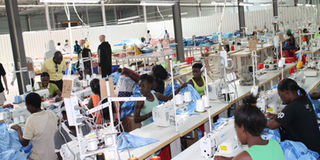Government fails to create 36,000 jobs

Busy. Workers go about their duties at a cloth factory at Kapeeka Industrial Area in Nakaseke District in February. Government says the Covid-19 outbreak blocked creation of thousands of jobs. PHOTO BY KELVIN ATUHAIRE
Government officials at the Uganda Investment Authority (UIA) have failed to create more than 36,000 jobs they promised last year due to unforeseen slowdown and are now calling for long and short term support to struggling businesses in the country.
In the January-March 2020 performance report, the UIA acting director general, Mr Lawrence Byensi, explained that government, through UIA, was able to create only 23,055 jobs from both the Domestic Direct Investments (DDI) and Foreign Direct Investment (FDI) as opposed to the planned target of 60,000 jobs.
“Cumulatively, the planned jobs in the last three quarters total to 23,055 of which 7,716 are being created by DDI and 15,339 by FDI. This numbers are significantly below the target, considering the investment licensed last financial year, which planned to create 60,000 jobs,” Mr Byensi explained yesterday.
Mr Byensi attributed reductions in job creation in the country to a number of investment owners who have been caught up in their home countries as a result of the Covid-19 pandemic.
He also said a number of staff were also caught up away from their homes and work.
The interruptions in transfer of investment funds and negotiations in some joint venture projects has also been cited as one of the reasons for the reduction in job creation.
“We are now undertaking a survey on the impact of the Covid-19 on investment in order to further inform government policy interventions. We shall also be able to tell how many people have lost their jobs since many companies have already informed us that they have laid off workers,” Mr Byensi said.
Addressing journalists at the Uganda Media Centre in Kampala yesterday, Mr Byensi said majority of the sectors that have been affected by the coronavirus pandemic and are in need of support include tourism, transport, manufacturing and agro-processing.
Mr Byensi said the analysis of the investments data indicates that the reduction in job creation will not only be occasioned by the reduced or slow implementation caused by the Covid-19 pandemic, but the type of job and investment funds required.
He added: “At least 52 per cent of the licensed projects are in manufacturing and light manufacturing, while four per cent are in agri-related industry. A number of manufacturing firms are beginning to employ automated machinery hence requiring less man power.”
UIA officials said they registered 75 projects in quarter three worth $302.6m (about Shs1.1 trillion).
He, however, explained that in the last three quarters, UIA has cumulatively registered 226 projects worth $751.3m (Shs2.8 trillion).
Ms Winnie Lawoko-Olwe, the director of Small and Medium Enterprises (SMEs), told Daily Monitor in a separate interview that much as Covid-19 has impacted on investment, especially the FDI and DDI, some SMEs have various opportunities to thrive both during and after Covid-19.
She revealed that the authority is set to train SMEs on how to brand their products for their region and on various marketing plans.
Investment Minister Evelyn Anite called for calm and promised a robust government response to the Covid-19 pandemic.
“As government, we are aware of the challenges investors are going through. We are going to use the on-going survey to see how best we can intervene and ensure job creation is not disrupted,” she said.



